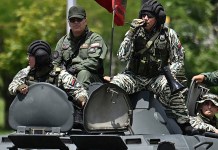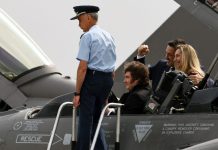In international diplomacy, China has been known for its subtlety and nuance. Beijing is rarely found to be rabble-rousing. However, in a recent China-EU meeting, European officials were taken aback by the directness of China’s Foreign Minister, Wang Yi, who reportedly told his counterparts that China would not accept Russia’s defeat in the Ukraine War.
Some insiders who participated in the meeting were surprised by the harshness of Wang’s message, just three weeks before a crucial summit in China. EU officials, including European Council President Antonio Costa and European Commission President Ursula von der Leyen, are scheduled to travel to Beijing later this month for a trade summit.
This was China’s most direct statement in support of Russia’s war in Ukraine.
China’s Foreign Minister Wang Yi reportedly told the EU’s top diplomat, Kaja Kallas, on July 3 that the country cannot afford for Russia to lose the war in Ukraine, amid fears that the U.S. would shift focus towards Beijing, the SCMP reported, citing sources familiar with the conversation.
Ukrainian and EU officials have repeatedly said that Russia can not continue its war in Ukraine without China’s help. However, the Chinese Ministry of Foreign Affairs has always maintained that the country is “not a party” to the war and remains “neutral” in the three-year-old war.

However, the latest statement by the usually soft-spoken Wang Yi suggests that China is no longer concerned about maintaining the charade of neutrality in this war. This sudden and dramatic change of tone by Beijing was unnerving to the EU officials.
Wang’s reported comments suggest that Russia’s war in Ukraine may serve China’s strategic needs as the US’s focus has deviated away from Beijing’s mounting preparation to launch its own possible invasion into Taiwan.
China’s Support For Russia’s War Efforts
Notwithstanding China’s professed claims of neutrality, Beijing has become a critical economic lifeline for Russia, especially after Western sanctions isolated Moscow from global markets. This support has helped Russia sustain its economy and war machine.
War In Ukraine Serves China’s Interest
Russia’s war in Ukraine is serving many strategic interests of the US.
In fact, one can argue that the US has gained more strategic victories over Russia in the last three years than in the three decades since the end of the Cold War.
Countries like Sweden and Finland, which have historically adopted a neutral stance towards Russia, are now NATO members. Europe is more united than ever. After decades of slumber, Europe is finally taking defense seriously, and for the first time since the end of the Second World War, an overwhelming majority of European countries are spending over two percent of their GDP on defense.
Countries like Germany, a European economic and industrial powerhouse, are shedding their historical self-imposed restraint on militarism.
The US can test and improve its weapons in real combat against Russia, and the Pentagon can degrade the Kremlin, its weapons stockpiles, and its army without putting any American soldiers on the ground.
Despite these numerous advantages, US President Donald Trump is working overtime to get a ceasefire deal in the Ukraine war. President Trump has been committed to ending the war since his first day in office.
On the contrary, China, supposedly Russia’s friend, wants this war to linger and continue. What explains this contradiction?
China’s “Buying Time”
In the post-Mao reform era of the late 1970s, Deng Xiaoping adopted the policy of “taoguang yanghui” (Hide your strength, bide your time).
The policy entailed avoiding provocation of Western powers or entanglement in costly wars, instead focusing on internal growth and advancing militarily and technologically until Beijing was strong enough to challenge Western powers.
China followed this policy religiously until about 2000 when it began to assert itself gradually.
It took the US nearly a decade to realize the momentous shift. Former US President Barack Obama announced the “Pivot to Asia” strategy in November 2011 to tackle the China challenge.
Trump gave a further boost to this thinking, in which the US viewed China, and not Russia, as its primary adversary. However, this policy shift in the US was jolted by two events,
Joe Biden’s victory in 2020 and Russia’s invasion of Ukraine in 2022 forced the US to stay focused and invested in Europe. Although Trump returned to the White House in 2025, he is unable to end the war and shift his attention to China.
There is a running joke in China that says that a ‘win-win’ situation means China wins twice. The Ukraine war is that ‘win-win’ situation for Beijing.
On the one hand, it is weakening Russia, pushing it completely into China’s sphere of influence. On the other side, it keeps the US engaged in Europe, allowing Beijing to fly under the radar while it prepares for a potential invasion of Taiwan.
This is the updated version of Deng Xiaoping’s ‘buying time’ policy.
As Trump intensifies his efforts for a ceasefire, Beijing is raising the stakes and doubling down on its support for Russia.
Last month, it was reported that a Chinese laser anti-drone system was spotted in Russia. In April, Ukrainian President Zelenskyy himself claimed that over 155 Chinese soldiers are fighting in the Russian Army. Last week, the Kyiv Post reported that Russia will train over 600 Chinese soldiers in countering NATO weapons.
“The Kremlin has decided to allow Chinese military personnel to study and adopt the combat experience Russia has gained in its war against Ukraine,” a HUR source told Kyiv Post.
And now this statement by China’s Foreign Minister Wang Yi that China would not accept Russia’s defeat in the Ukraine War.
With each passing week, China’s involvement in the Ukraine war is becoming more and more direct.
The road to peace in Kyiv, it seems, passes through Beijing.
- Sumit Ahlawat has over a decade of experience in news media. He has worked with Press Trust of India, Times Now, Zee News, Economic Times, and Microsoft News. He holds a Master’s Degree in International Media and Modern History from the University of Sheffield, UK.
- VIEWS PERSONAL OF THE AUTHOR.
- He can be reached at ahlawat.sumit85 (at) gmail.com




